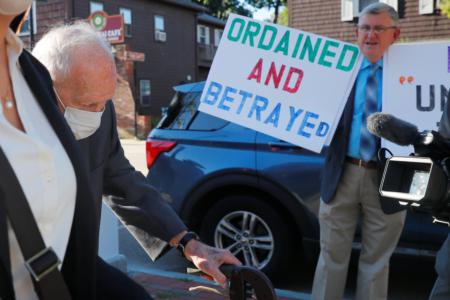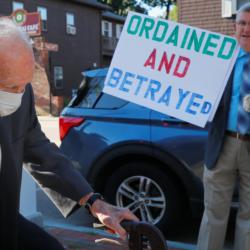Transgender rights bill ‘unfairly skewed,’ MCC says
BRAINTREE -- A bill that seeks to broaden existing anti-discrimination statutes should not pass, opponents say, because it would have mammoth social and legal ramifications.
The proposed Transgender Rights Bill, which is being discussed by lawmakers on Beacon Hill, would add gender identity and expression to the state’s existing anti-discrimination and hate crimes statutes.
Proponents claim the bill is a necessary civil rights legislation due to perceived high rates of discrimination against and a lack of legal protection for the transgender community.
Others, including the state’s Catholic bishops, say the bill is vaguely worded, over-broad and could have far reaching consequences such as prohibiting gender-specific activities at schools -- including sport teams -- and the elimination of gender-based privacy rules in public accommodations such as restrooms, changing areas or locker rooms.
Other provisions of the bill include increased penalties for assaults deemed to target an individual because of transgender status, forbidding schools from discriminating based on gender identity and expression in admissions and activity participation policies, making it illegal to deny entry to public facilities based on gender expression or identification, and expanding the scope of existing state commissions that prevent discrimination and serve gay, lesbian, and bisexual youth.
Currently, the bill is being considered by the Legislature’s Joint Committee on the Judiciary. The committee could opt to advance the measure or recommend it for further study. Nearly identical versions of the bill exist in the House and Senate.
In legislative testimony on the bill in July 2009, Ed Saunders, executive director of the Massachusetts Catholic Conference, the public policy arm of the state’s Catholic bishops, said that the bill’s prohibitions against discrimination are too broadly defined to include all forms of gender expression, which are to be protected even when the identity does not correspond to one’s biological gender.
He also said that the bill raises important policy concerns because it would allow admission to “sex-specific” programs or facilities based on arbitrary gender identification, and would allow anybody to identify with any gender at any moment, broadening the current Supreme Court’s definition of a transgender individual as “one who has ‘[a] rare psychiatric disorder in which a person feels persistently uncomfortable about his or her anatomical sex,’ and who typically seeks medical treatment, including hormonal therapy and surgery, to bring about a permanent sex change.”
Saunders stated that the bill “seeks to impose a far-reaching and unfairly skewed remedy” to a problem that affects a small number of individuals with a medical condition that makes them experience “clinically significant” discomfort in certain settings by overriding the privacy interests of other persons.
“It is a contradiction to argue that the discomfort of one group requires the granting of access to other settings that then causes the discomfort of another group, as if the discomfort of those others who rely on the privacy of single-sex settings does not count.”
Privacy rights would also be violated, said Saunders, because sex-specific facilities like restrooms exist to insure privacy.
Saunders also said that existing legal policies regarding biological differences between genders would be undermined by the bill.
“Creating a new ‘right to gender self-determination,’ as this bill would accomplish as a matter of practice, would destabilize the law, override privacy, and conflict with conscience,” Saunders’ testimony concluded. “As a result, the bill would interfere with core interests, policies, and protections that flow from consideration of justice and the common good.”
According to Saunders, the law would promote reverse discrimination.
In an interview with The Pilot, Saunders questioned the value of levying increased penalties against a person who attacks a transgender individual when crime laws already exist that forbid assault.
“Why should greater rights be given to a transgender individual over a non-transgender individual? If you give greater rights to the transgender individual, you’re discriminating against the non-transgender person,” Saunders said. “It’s almost like reverse discrimination.”
Kris Mineau, president of the Massachusetts Family Institute, expressed similar concerns in an April 26 media release. He said that single-sex sports teams could be forced to accept student-athletes regardless of gender in spite of safety concerns.
Mineau also chided the bill because he said it does not include religious exemption, which he said is standard in this type of legislation.
However, Rep. Jason Lewis (D-Winchester) accused the bill’s opponents of fear mongering.
“It’s very unfortunate some opponents have created a fiction about bathrooms to misrepresent the bill and create fear,” he said. “This has nothing to do with access to bathrooms or women’s facilities.”
He said the bill would not protect someone who arbitrarily identified with one gender to gain access to a restroom.
“That person could be thrown out and would not have protection under the law according to this bill,” he said.
Rep. Carl Sciortino (D-Medford) introduced the House measure last year. Reps. Jason Lewis (D-Winchester) and Joseph Driscoll (D-Braintree) recently filed the bill as a budget amendment during this year’s budget process. Their amendment was eventually tabled.
In a statement on the Massachusetts Catholic Conference’s website, Saunders said that Lewis’ and Driscoll’s action was an attempt to “circumvent the normal legislative process,” but Lewis said his actions were normal and pointed out that numerous policy amendments were proposed as part of the budget process.
Associated Press materials contributed to this report.



















